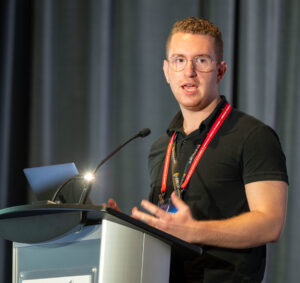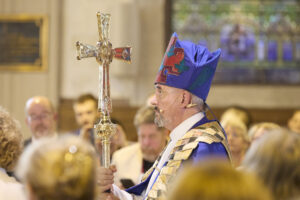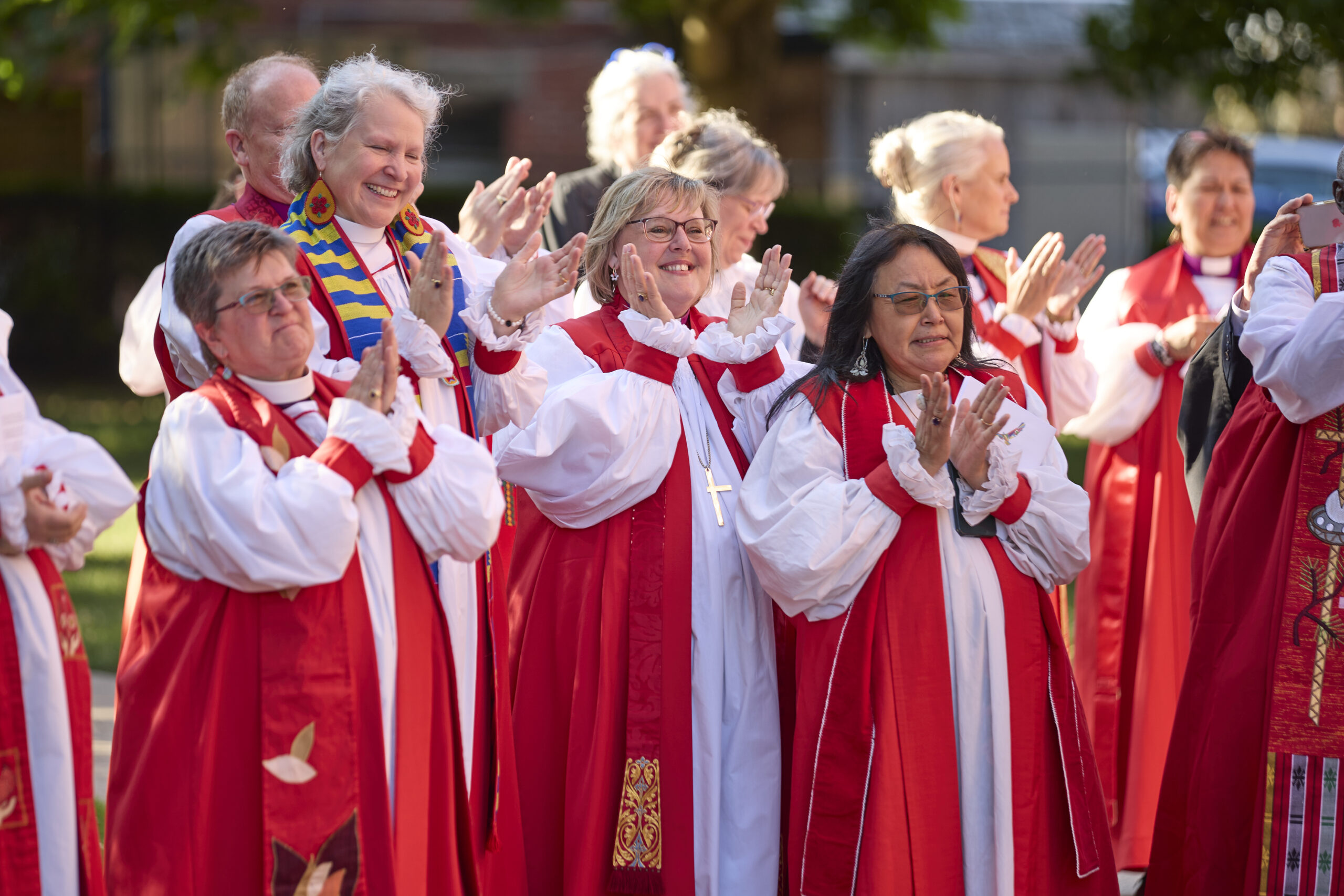In June, Anglicans from coast to coast to coast gathered in London, Ontario, for the 44th General Synod of the Anglican Church of Canada. Its theme, “They will soar on wings like eagles” (Isaiah 40:.31), served as a touchstone for its worship, events, and actions. Members entered into a week of deep discernment about the Church’s future in the face of the present economic, political, and climate crises that call on Christians to act for justice for God’s Creation.
Reflecting on her experience, diocesan lay delegate Susan Little highlighted the potent, hope-filled sermons delivered throughout the week. “For me, the highlight of General Synod is the powerful messages that the Spirit inspires throughout our time together in worship or moments of its proceedings.”
This included a stirring sermon by Bishop Michael Curry, the retired presiding bishop of the Episcopal Church in the United States, which set the tone for the week. Little shares, “With animated delivery and enthusiasm, he recalled our faithful ancestors who couldn’t see the ‘big picture’ of what God was doing but trusted that the outcomes were part of God’s plan.” The bishop reminded those assembled of the story of Queen Esther and how, despite humble beginnings, she was able to make a difference in people’s lives. “Implicating us in the exciting business soon to unfold throughout the coming seven days together, he told us that ‘You are not here by accident. Who knows—you may have come to the kingdom for such a time as this.’ Now, that is some pressure to pay attention!”
In her primatial address, Archbishop Anne Germond offered words of hope and encouragement to the Church. “As we continue to be shaped by the Risen Christ, let us hold tenaciously onto the promises of God, trusting in God’s never-ending faithfulness to be with us in all our doings,” urged the acting primate. For Little, this was another stirring message of hope, “urging us to let go of old patterns and to soar in faith, rising to the new challenges.”
The main business of the Synod was the consideration of the Creating Pathways for the Transformational Change report, as recommended by the Primate’s Commission on Reimagining the Church: Proclaiming the Gospel in the 21st Century. The six pathways articulated in the report seek to streamline the structures and organization of the Church, reducing its costs while empowering and supporting parishes to proclaim and live out the Gospel message.
“Each of the pathways have the potential to transform the Church in ways that are prophetic, bold, and faithful,” reflected Archdeacon Bill Mous, one of Niagara’s clergy members. “Taken together, and with the Spirit’s leading, the possibilities to reshape our Church for its 21st century witness are all rather breath-taking to behold.”
Members overwhelmingly embraced the report and urged the primate and officers of General Synod to begin actively pursuing the pathways, authorizing up to $2 million to be allocated for this work over the next three years.
When describing the significant challenges ahead, Archbishop Germond compared the Canadian Church to that of the people of ancient Israel, returning to Jerusalem after decades of exile. She stressed that it needs to give up its internal divisions to see its way forward through cooperation. The acting primate warned that, “if we are to succeed at all, we can only be a unified church, walking together into the future with bold, prophetic hope, extending the hand of grace to one another at every opportunity.” She added, it will be “a time of sacred and holy risk-taking.”

During the synod, Bishop Susan Bell brought forward two successful resolutions which drew from Niagara’s ministry experience. The first called for a national strategy for local ministries of hospitality and advocacy with migrant workers in Canada. This strategy would strengthen the commitment of the Church toward the elimination of human trafficking and modern slavery with faith-based ministries that support migrant workers, addressing systemic injustices that migrant workers experience.
The second resolution, seconded by Archdeacon Bill Mous, called for the Council of General Synod to share and study the principles of ability and inclusion. Jodey Porter of St. Mark’s Niagara-on-the-Lake delivered a powerful presentation on this relatively new field of enquiry in theology, reflecting on her lived experience and work as the Anglican representative for the Evangelical Lutheran Church in Canada’s Taskforce on Ability and Inclusion. The resolution seeks to build on ten Tenets of Disability Theology outlined in The Disabled God, a book by Nancy Eiesland. These tenets state that all people are reflected in God’s image, including those with disabilities and maintain that disability is not a sin or a divine punishment.

Youth and young adult members, including Niagara’s Paige Keller of St. George’s, Guelph and Adam MacNeil of Church of the Resurrection, Hamilton, actively participated with passion and purpose in all aspects of the synod.
McNeill brought forward a resolution that would allow for greater youth involvement in the Council of General Synod, and he seconded a resolution calling for the creation of a national youth council. Both resolutions were carried.

On Thursday, June 26, the election for the new primate took place at St. Paul’s Cathedral in London. After the second ballot, the order of laity requested that additional names be added to the original slate of four candidates. The order of bishops nominated Archbishop Shane Parker, and he was ultimately elected by the members of the laity and clergy on the fifth ballot.
“Archbishop Shane has long been a faithful and wise shepherd within our province, as Bishop of Ottawa,” said Bishop Susan Bell. “His deep pastoral sensitivity, theological insight, and unwavering commitment to justice and reconciliation, as well as his laser focus on priority issues, have been a deep blessing to our province and will continue to be so for the wider Church.”
Reflecting on the electoral process, Little was impressed with “its utter reliance upon the Spirit!” She added that “through the offering of prayer, singing and reflection all day long, we became part of a greater universe.”
Little was also inspired by the newly elected primate’s address to members upon entering the cathedral after his election. “He described the mitre that he was expected to wear and discovered all sorts of padding, duct tape and staples, holding it together. As it was, it wouldn’t fit, so he took it apart so it could be useful again. Just like the Church, the primate said we must get rid of what’s not necessary anymore. He concluded that there’s a need for “deep change in our culture” to do what the Church should be doing, and he encouraged us “to courageously live into that change.”
Towards the end of the week, elections were held for the Council of the General Synod, the executive governance body that meets between general synods. Bishop Susan Bell and Paige Keller were elected to serve on the council for the next three years.
Throughout the synod, Niagara’s witness to the discernment, discussion, and decisions of the synod was well served and well represented by its delegation. From serving on sessional committees to speaking to resolutions, engaging in presentations, to supporting members in crafting resolutions, those from Niagara made significant contributions to all aspects of the leadership, organization, worship, and debate of the synod.
Buoyed by the generous hospitality of the Diocese of Huron, inspired by the prayerful witness of the Synod, and guided by new leadership and directions for ministry, members of the General Synod charted a Spirit-led course for the Church for the years ahead with faith and hope.

The Journey of Light: From New Year to Epiphany